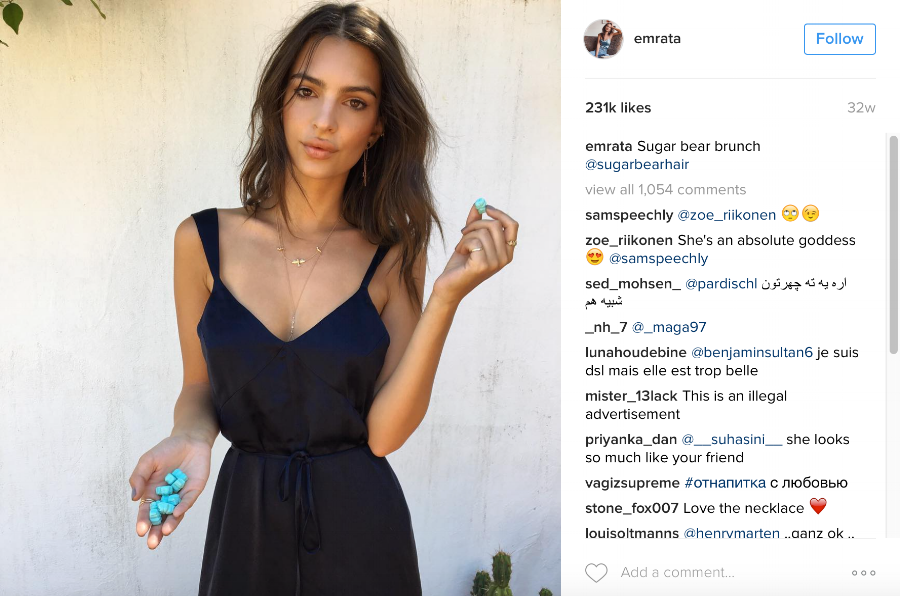
image: @emrata Instagram
Undisclosed paid ads are a serious problem on Instagram, running through the fashion industry and beyond, and the Federal Trade Commission (“FTC”) has yet to take action to enforce its policy, said Public Citizen, the Campaign for a Commercial-Free Childhood and the Center for Digital Democracy in a letter addressed to the governmental agency on Wednesday.
The letter was a follow-up to a letter the groups sent to the FTC on September 7, which documented more than 100 examples where products were featured in celebrity, athlete and personality Instagram posts but were most likely undisclosed ad campaigns or came about as a result of a material connection between the parties. The letter sent on Wednesday includes 50 new examples of undisclosed influencer posts on Instagram, including posts by David and Victoria Beckham; Pretty Little Liars actresses Ashley Benz, Shay Mitchell, and Lucy Hale; models Emily Ratajkowski and Heidi Klum; Kris Jenner, Kourtney Kardashian; Chrissy Teigen, Scott Disick, and Jennifer Lopez.
The FTC has a longstanding policy stating that paid endorsements should be clearly identified with #sponsored, #advertisement or #ad hashtag. In line with its “unique dual mission to protect consumers and promote competition,” the FTC issues guidelines to aid the public in ensuring that advertisements are not misleading and thus, do not violate Section 5 of the FTC Act, which provides that “unfair or deceptive acts or practices in or affecting commerce are declared unlawful.” However the FTC has yet to respond to the groups’ request to enforce its own policy.
“The practice of undisclosed influencer advertising covertly promotes products that could harm consumers, especially teens and young adults,” according to a joint statement from the parties on Wednesday. A core principal of fair advertising law in the United States is that people have a right to know when they are targets of advertising. On Instagram, disguised ads are rampant; deceived consumers often believe celebrities are making unbiased endorsements of brands. They don’t realize that those celebrities are paid and may not even use the touted brand.
The letter also points to an emerging form of influencer marketing that uses average consumers as marketing agents, and cites Influenster and BzzAgent as the primary agencies. As we told you earlier this year, on the heels of its “7 bags for 7 cities” contest this spring, Versace launched another contest, this time to coincide with the release of its Greca Stars aviator sunglasses. Taking place from May 4th to 17th, the contest called on consumers to “either take a selfie with the Greca Stars in selected Versace boutiques worldwide and then post it online with the #VERSACESELFIE tag, or they can check the brand’s @VersaceHomeWW, @DVHomeMilan and @VersaceBoutiques to spot a selfie of Donatella Versace sporting the sunglasses.”
A smart initiative, the contest got Versace fans to promote the brand on social media (something brands normally pay influencers large sums to do) for largely no cost to the brand at all, save for the few pairs of Greca Star sunglasses that were awarded to contest winners. The problem: The contest was probably illegal, in violation of the FTC’s guidelines.
A Public Citizen survey shows that many users of Influenster and BzzAgent are not disclosing that they have received a free product, deceiving their followers in the same way that celebrity “influencers” do. The organization blames Influenster and BzzAgent, not their users, for this systematic deception.
“Consumers are being bamboozled by the digital scam known as influencer marketing. Products are being pitched using deceptive tactics, tricking a consumer into believing they are receiving legitimate advice or recommendations online,” said Jeff Chester, executive director of the Center for Digital Democracy. “The FTC needs to crack down on these 21st Century scammers, and ensure that the public is treated fairly by digital advertisers.”
“There is abundant evidence that children and teens are particularly vulnerable to advertising masquerading as ‘content.’ The longer the FTC lags on this issue, the more children and teens are subject to this form of unfair and deceptive advertising,” said Josh Golin, executive director of the Campaign for a Commercial-Free Childhood.
The letter at hand comes on the heels of a similar letter that Truth in Advertising Inc., a Madison, Connecticut-based organization, filed with the FTC earlier this year, alleging that Kris Jenner and the Kardashian/Jenner family “are engaged in deceptive marketing campaigns.” The FTC seemingly failed to take action in connection with that letter, as well.







